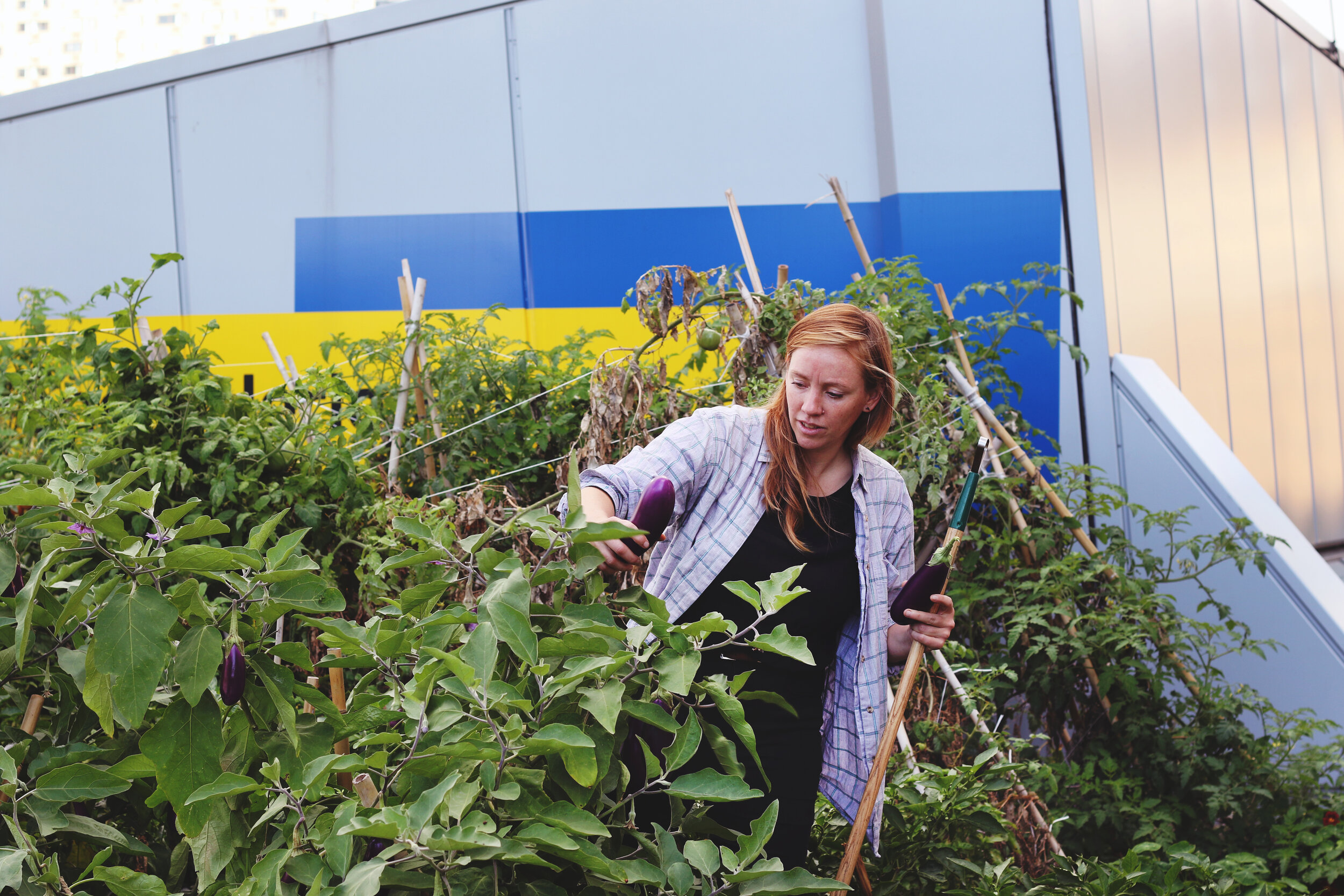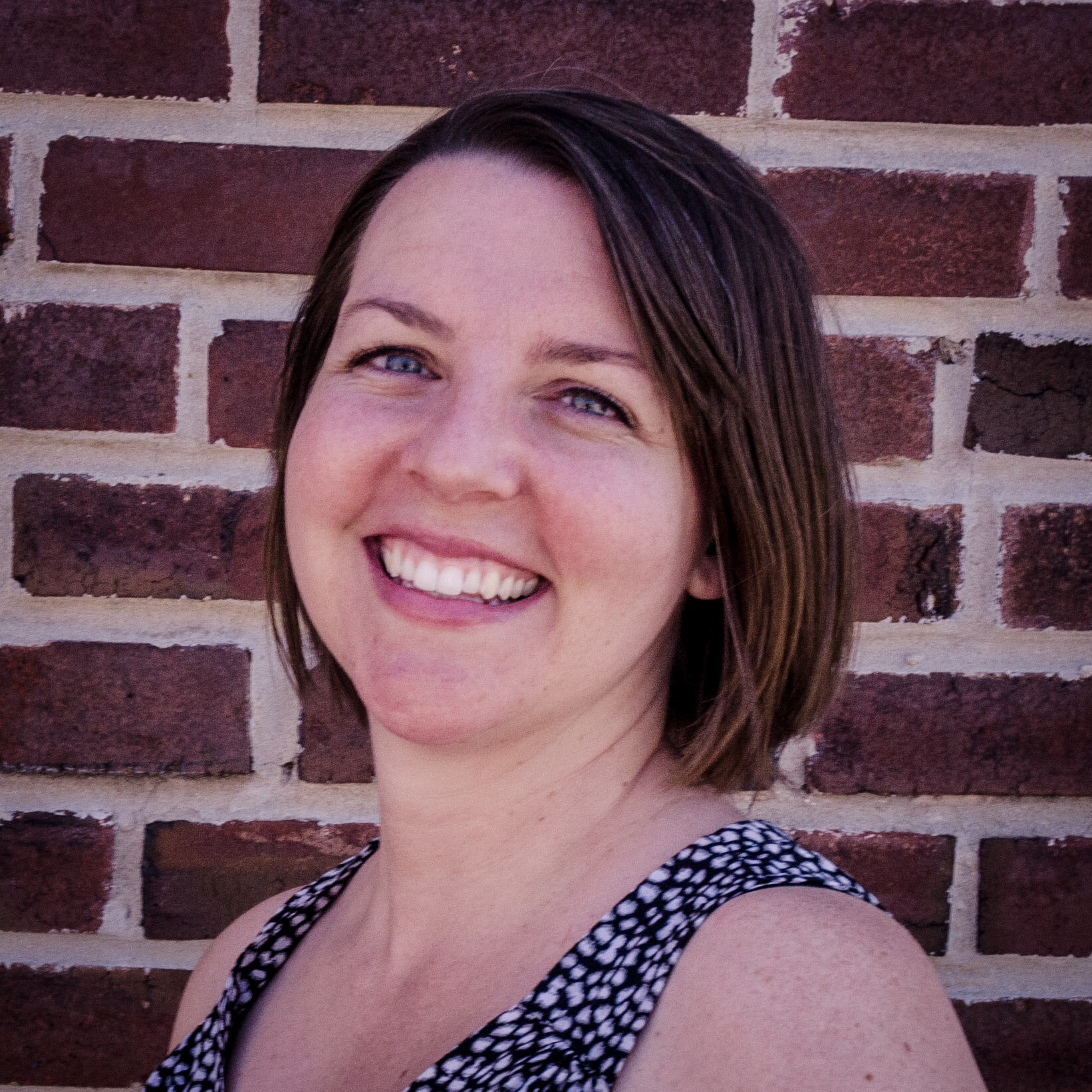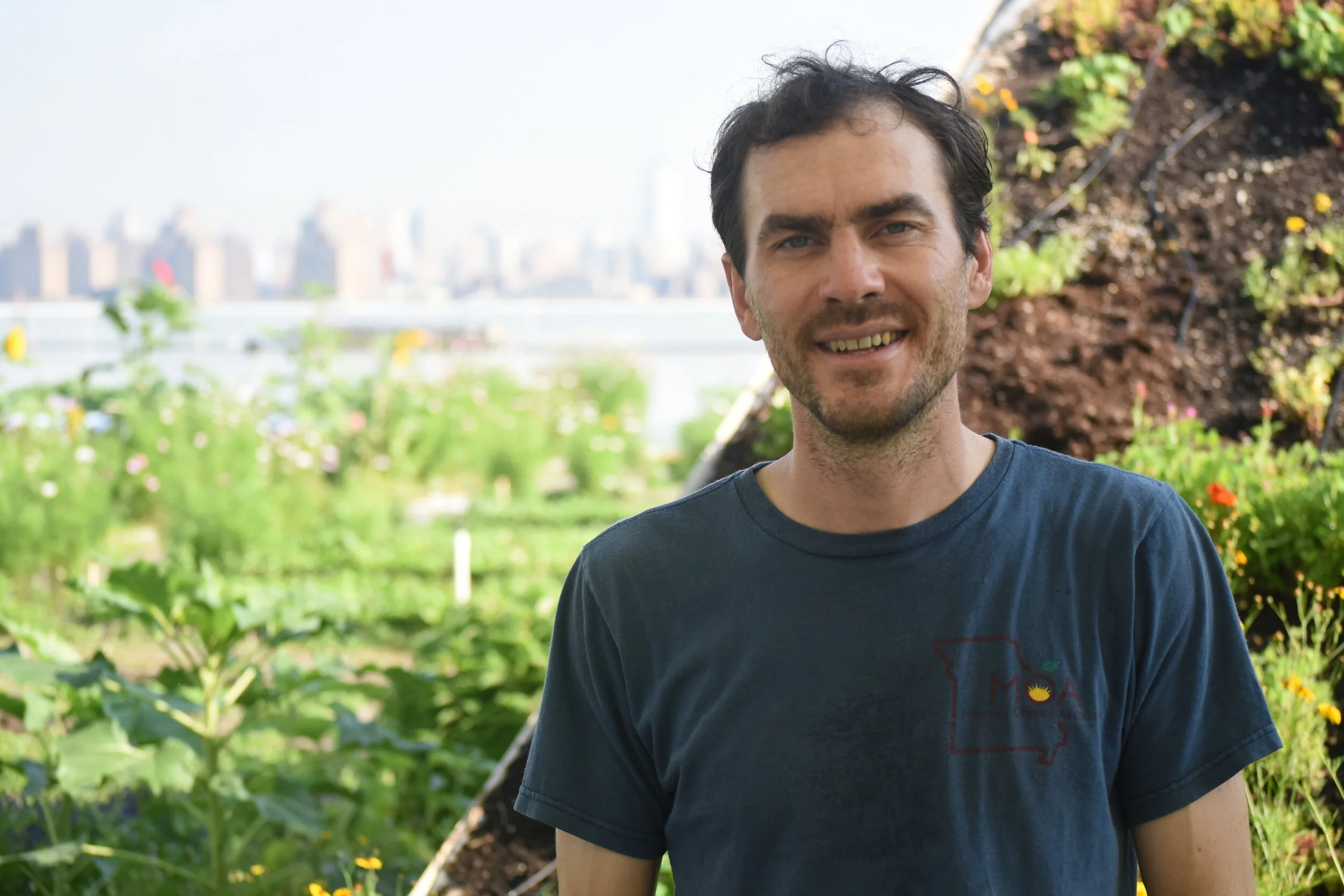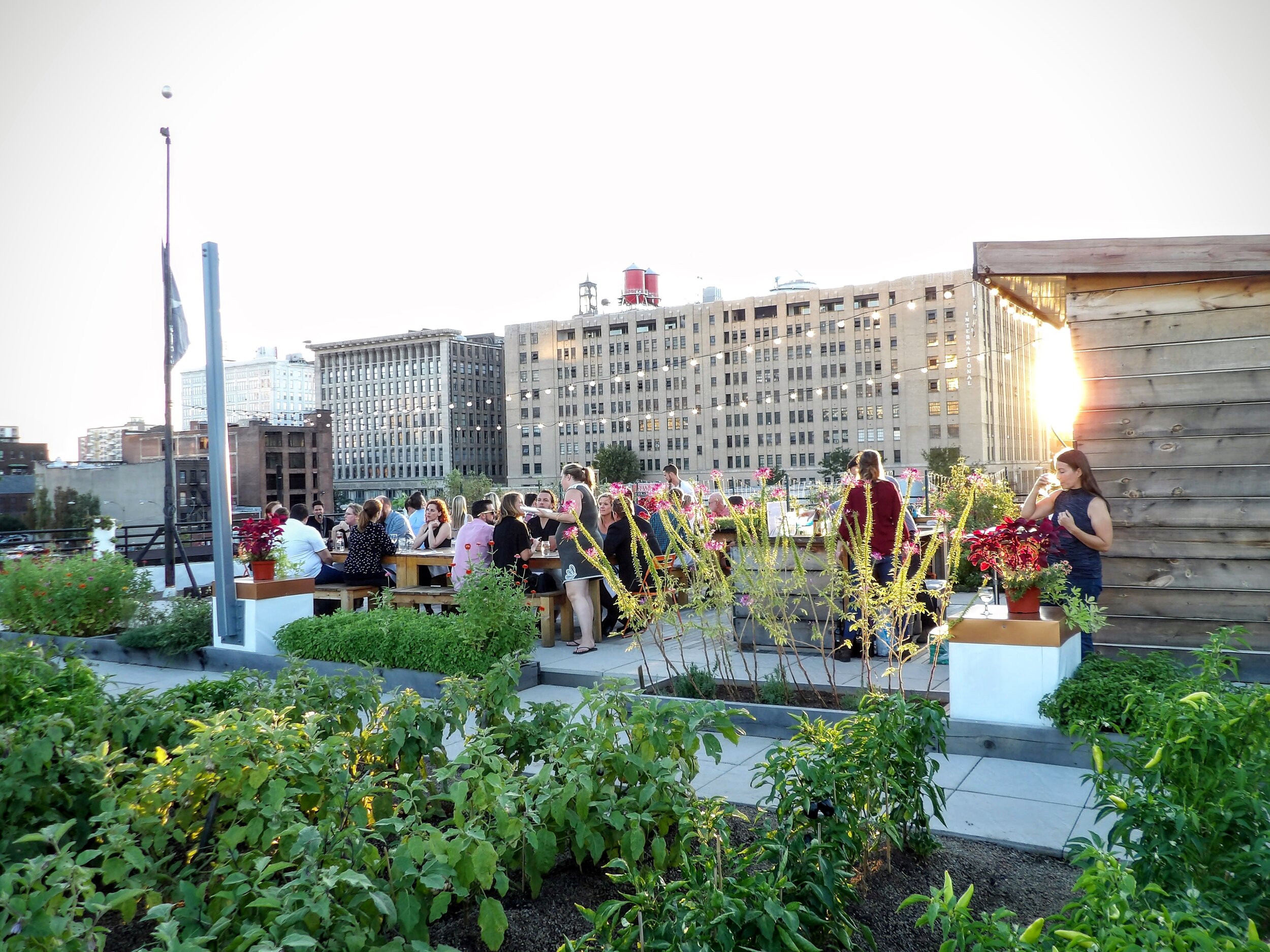Three Rooftop Farmers Reflect On Social Benefits
Just ten years ago, you could count the number of rooftop farms on one hand! Now there are perhaps 40. This is no doubt due to the fact that rooftop farmers are not only a resilient bunch, but the ultimate multi-taskers too. Rooftop farming is still very much in its infancy, yet these farms are already making a unique and multifaceted contribution to the communities they serve. Three outstanding urban farmers from different regions reflect on the social aspects of what they do, in this special 20th Anniversary Edition of On the Roof With.. Arlene Throness, Farm Manager, Ryerson University, Toronto; Jamie Wallace, Director of Operations, Urban Harvest STL, St. Louis; and Ben Flanner, Co-Founder and CEO, Brooklyn Grange, New York City.
LAM: In what ways does growing food on the roof also meet or support social objectives, such as education, justice, and engagement.
AT: In addition to the abundant harvest, one of the greatest advantages of having a rooftop farm here on the Ryerson University campus is the opportunity for people to enjoy the space, meet other garden enthusiasts and learn practical skills in urban farming. We had over 800 people visit the farm this year. It’s a unique space, located in the heart of Toronto’s downtown core, where people can interact with soil, plants, insects, birds and microbes. It’s easy to forget we’re on a roof.
Arlene Throness, Farm Manager, Ryerson University, Toronto
Jamie Wallace, Director of Operations, Urban Harvest STL
JW: Education and engagement is a huge component of what we do. We educate the community on urban agriculture, equitable food access for underserved communities, and on the importance of eating fresh, local foods. In 2019 we graduated 37 interns from our Leadership in Urban Agriculture program and had nearly 700 students visit on field trips. In total, this year we welcomed over 2,700 visitors - whether they were visiting for educational purposes, attending an event, or just satisfying their curiosity about our rooftop farm.
BF: We run a farming operation which I’m really proud of, and grow nearly 100,000 lbs. of nutritious vegetables every year. And the education which takes place on our roofs is just as important as our food production. We host nearly 200 events per year which include a massive amount of education on healthy living, healthy lifestyles, nature, and of course – Green Infrastructure. Our educational non-profit partner, City Growers, has also hosted 50,000 NYC youth over the past nine years on our farms for educational field trips, after school programs, and summer camp sessions. Learning how food is grown is really important for our future generations – especially kids growing up in urban centers without regular access to greenspace, nature and traditional agriculture.
LAM: It seems that using rooftops for farming provides greater employment and volunteer opportunities than say an amenity green roof, or sedum roof? Is this true and if so, how do your operations generate jobs and volunteer opportunities?
Ben Flanner, Co-Founder and CEO, Brooklyn Grange, New York City
BF: We now employ 20 full time people, in addition to at least that many seasonal crew, between the three areas of our business: Agriculture, Design & Build, and Events. This employment occurs on our three leased roof farms, plus in other green spaces all over the city. And yes, for sure – agriculture is a much higher rate of labor per square foot of maintenance compared with, for example, tending to a green roof planted with sedum.
JW: Our organization operates three rooftop farms in addition to several other at-grade sites, and a growing installation in Busch Stadium where the St. Louis Cardinals play baseball. Because all of our locations are food-producing, they require regular water and maintenance, much more so than a traditional sedum roof. As a non-profit organization, our staff is relatively small with six full and part-time employees, and we rely on the incredible amount of support we receive from interns and community volunteers to do this work and support our collective impact.
AT: The Urban Farm team has steadily grown as we expand our programming and operations. We began the project in 2014 with two part time staff and 20 dedicated volunteers who converted the Andrew and Pringle Environmental Green Roof on the George Vari Engineering and Computing Centre into an urban farm. Today we have three full-time staff, three part-time staff and six paid student positions in summer and fall. Our team will grow again in 2020 when we open our second site across the street on the new Daphne Cockwell Health Sciences Complex, which will be the first purpose-built rooftop farm under Toronto’s Green Roof bylaw.
A gathering at the FOOD ROOF Farm in St. Lois. Photo Courtesy Eldar
LAM: Most of the rooftop farms I have visited have a robust relationship with the communities in which they operate. How do you approach this with your farming operations? What would you say are the main community benefits to having a rooftop farm nearby?
JW: It’s funny you ask - the FOOD ROOF Farm came into existence because our founder, Mary Ostafi, was a downtown resident without access to green space. She and many other downtown residents had the desire to grow their own food but lacked a space to do so. They started a community garden first by renting an under-utilized city lot, but were asked to relocate several times. After moving the garden repeatedly, Mary and her husband, who are both trained architects, began to look at the available rooftop space downtown. The FOOD ROOF Farm was built with community in mind and has ten garden plots reserved for downtown residents, along with a community hub space where we host educational workshops and events. One of the biggest advantages of a rooftop farm in downtown St. Louis is that it offers an opportunity to connect city residents with a local food system. They don’t need to go far to learn about growing their own food or to see it in action.
AT: The Urban Farm is a very beloved space at Ryerson. It truly is our campus farm. Everybody pitches in and helps out to keep the farm running, whether on the farm or behind the scenes. No matter how busy volunteers are throughout the academic year, they never miss a shift on the farm as they say it’s what allows them to decompress and re-energize in times of stress.
BF: It is important to find locations where we can engage at ground level too – especially by supporting the local economy. Accessibility is also a huge priority for us as well. We want to offer the public as much opportunity as possible to visit. We have free open days at two farms, now on both days of the weekend, every weekend through the season. In terms of events, we are dedicated and proud to offer dozens of affordable educational workshops per year. This year, we were particularly excited to partner with a local food pantry. We secured funding via a generous grant that allows us to harvest, deliver, and donate thousands of pounds of free food, where it will be distributed to our local Sunset Park, Brooklyn community.
A community dinner is hosted at the Brooklyn Grange Rooftop Farm in Long Island City, Queens, New York. Photo Courtesy Brooklyn Grange.
LAM: Are you planning anything in the future that supports or engages the community, particularly disadvantaged communities?
BF: We worked hard to develop the capability to accept SNAP (Food Stamp) benefits in the middle of this season, and we very much look forward to a full season accepting those transactions. The food pantry relationship mentioned above will also be scaling up in this coming season, so we are excitedly planning and planting for that. Running a good business that operates within its community is an ongoing process. We are always seeking additional dialogue with neighbors to learn from them, and to help us all steer the business in a positive direction.
AT: We’re currently doing accessibility upgrades on the rooftop farm in order to increase programming and engagement. This expansion, along with the new rooftop farm, will include accessible garden beds, a community gathering space and a greenhouse for year-round education. We’ll continue to offer a range of programs, including drop-in volunteering, hands-on workshops, an Urban Farm training series and guided field walks and tours. We’re increasing partnerships with campus groups, including a project with Aboriginal Initiatives to grow the four sacred medicines and native plants that support our surrounding ecosystem. We continue to donate produce to The Good Food Centre where students can access emergency food relief and share community meals.
JW: Absolutely! Urban Harvest STL believes in food rights - all members of our community should have equitable access to fresh, healthy food regardless of socio-economic status, race or location. We grow healthy produce across a network of seven urban farms in the heart of St. Louis, Missouri, and empower communities to cultivate equitable access to healthy, sustainably grown food. Our farms are located in an area of low access, where food insecurity is prevalent. This means that there are few grocery stores nearby offering fresh, affordable foods. To increase the availability of fresh produce, we donate over half of the food we grow to partner organizations who then distribute the food within our community. We strive to be a resource and an inspiration to anyone who wishes to learn about growing their own food or integrating sustainable food choices in their daily lives. We are currently planning our program calendar for 2020 -- which includes collaborations with local chefs, wellness and agriculture experts -- to engage members of our FARMily through educational and celebratory food-focused events.
Arlene Throness is passionate about growing, sharing and enjoying food and is the Urban Farm Manager at Ryerson University where she manages a quarter-acre rooftop farm. She studied Food Security at Ryerson's Chang School, earned a Bachelor of Arts in Political Science and Human Geography at Concordia and is a graduate of Linnaea Farm's Ecological Garden Design Program.
Ben Flanner is co-founder and CEO of Brooklyn Grange, a rooftop farm, sustainable events venue, and landscaping company based in NYC. More than 50,000 students from grades K-12 have visited the farm since 2011.
Jamie Wallace is the Director of Operations at Urban Harvest STL and loves helping people make meaningful connections with their food and farmers. She has spent the majority of her career in the hospitality industry while cultivating a passion for local food systems.





